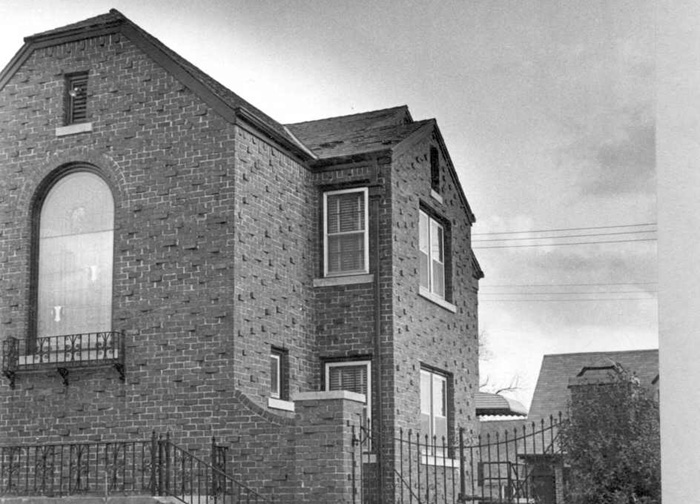624 Culbertson Drive

1500 Stiles
624 is a dark red brick house with projected header bricks at random with an English pitched wood shingle roof. The principal wing has a gable (with hip at peak) facing the street and a huge leaded glass window with leaded devices -- two shields and a plumed helmet. Parts of the second story have vertical board and batten walls painted dark brown. There is a wide terrace across half of the front with wrought iron railings and a large wrought iron motor gate to the west.
Leslie Fain 1932-1936
Lloyd Judd 1936-1948
Lloyd Judd was once a member of the State Planning and Resources Board and during World War I was a member of the American expeditionary force in Siberia, but he was best known for waging a one-man war against oil wells in Lincoln Terrace.
Judd's involvement came during the administration of Governor E.W. Marland, when early in 1935, the No. 1 Mary Green well was drilled just northeast of the governor's mansion. This well and others preceding it revealed that the fashionable residential area, the University of Oklahoma Medical School and hospital grounds, and the executive mansion and the capitol itself were situated atop a productive oil structure.
A special election was held March 24, 1936, in which the voters created a one-mile-square drilling zone. The election created a storm of protest from social clubs and politicians who feared the beauty of the state house grounds would be marred by unsightly derricks and slush pits. Governor Marland, who had just donated 300 truck loads of shrubbery to the capitol grounds from his Ponca City Estate, joined the objectors.
But Marland himself was an oil operator and began a valiant effort to protect the state's interests in the oil reserves lying beneath the capitol property. After a 10-day gubernatorially declared state of martial law, Marland's board of affairs awarded leases on 16 separate tracts to the Sunray Oil Company and the Anderson-Prichard Oil Corporation. Then he employed the National Guard to back up his program to prevent the state lands from being drained of oil by the adjacent leaseholders. The governor was abused for his use of martial law, but the courts sustained him in his program by declaring that the city council had no jurisdiction over state lands.
Judd came to Oklahoma from Arkansas in 1934, and a year later moved into his Lincoln Terrace home and almost immediately into the oil well controversy.The focus of Judd's battle was state drilling on Lincoln Boulevard's parkway median, and the oil drillers' use of big oil field trucks on streets throughout the neighborhood.
Judd, through his attorney John Shirk, another Lincoln Terrace resident, slapped a federal court suit on the British American Oil Producing Company to enjoin the state parkway wells, which he said were damaging his property.
Always the scrappy in-fighter, Judd told the newspapers during the fight that "the folks along the boulevard used my home for meetings when they were talking of fighting the parkway wells. I made contributions along with the rest of them, and they started to go over to the other side one by one as the state cut them in on the royalties. Pretty soon, I was all alone."
Judd may not have won his fight, but did make other contributions to the state's development.
He was president of the First National Bank in Ardmore, which organized in 1887 as a private bank and chartered in 1889. It claims to be the oldest bank in the state. In 1946, Judd was chairman of the Oklahoma State Symphony drive for funds. He was named to the State Planning and Resources Board by Governor Roy J. Turner in 1947, was formerly executive vice president of a city-based life insurance company, and was influential in establishing Citizens State Bank.
Judd died in Ardmore at the age of 55 in 1949.